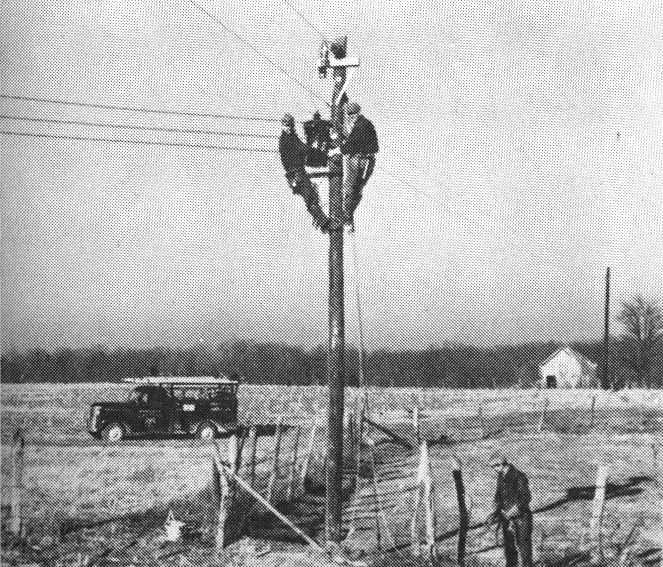
When electric cooperatives began operation in the 1930s, the organizers knew very little about running an electric company; they just knew how much this innovative product – electricity - was going to change their lives. Electric cooperatives were created because the big power companies said the distances were too far to make serving the rural communities economical. The rural people of Paulding County rose up to form their own power company, Paulding Putnam Electric Cooperative (PPEC). The lines ran to rural areas, the lights came on, and life was never the same.
One of Paulding Putnam Electric’s first office locations was on the corner of Perry and Main streets. Office space was rented and shared with Reinhart Chevrolet. The trucks were housed in shared space with the livery stable on the corner of Perry and Cherry. Because the office was too small and trucks were not on site, PPEC decided to invest capital and purchase 4 acres of the land from Hal Gasser at the corner of Gasser and North Williams Street. After decades in that facility, PPEC outgrew their office on North Williams (now a gas station) and moved to their current location on McDonald Pike in Paulding in 2011.
Before people signed up to be a member of a cooperative, they had to be taught how to use electricity and how it could benefit them. The “REA Circus” traveled and demonstrated lighting, laundry, and farm equipment.
When the power went off for whatever reason, it was common practice for a member to mail a postcard to the office and wait weeks for someone to come fix it. That’s hard to imagine now in 2020, since new software/equipment can restore power outages within 90 minutes or less, pending the situation.
In 1941, there were approximately 2,400 members. Now there are roughly 12,900 members and 42 employees to serve their needs.
During the rich 80 plus years of history, the following General Managers have served PPEC:
- Verl Patterson, 1935 to 1941
- Charles Kohart, 1941
- Herb Monroe, 1941 to 1978
- Floyd Furrow, 1978 to 2005
- George Carter, 2005 to 2023
- Randy Price, April 2023 to present
A co-op is founded when people with a similar need form an organization to provide goods or services, like a farmers market food co-op or financial services credit union co-op.
Electric co-ops were formed in much the same way to provide electricity to rural areas abandoned by for-profit electric utilities. There are no Paulding Putnam electric customers. Our Member-Owners have an equal voice in the co-op’s direction and certain rights that are quite different from those who are customers of a for-profit utility, owned by shareholders. Members gain a share of the co-op ownership as they use our services. Our net margin after expenses and reserves does not belong to the utility; it belongs to our Members. The margins must be used either to improve and maintain operations or be distributed back to Members. This is a major, unique and beneficial aspect of a cooperative.
Electric cooperatives are: private, independent electric utility businesses owned by the members they serve incorporated under the laws of the states in which they operate established to provide at-cost electric service governed by a board of trustees, elected from the membership, who set policies and procedures that are implemented by the cooperatives’ professional staff.
Cooperatives around the world operate according to the same set of core principles and values, adopted by the International Co-operative Alliance. Cooperatives trace the roots of these principles to the first modern cooperative founded in Rochdale, England in 1844. These principles are a key reason that America’s electric co-ops operate differently from other utilities, putting the needs of their members first.
1. Open and Voluntary Membership
Membership in a cooperative is open to all persons who can reasonably use its services and stand willing to accept the responsibilities of membership, regardless of race, religion, gender, or economic circumstances.
2. Democratic Member Control
Cooperatives are democratic organizations controlled by their members, who actively participate in setting policies and making decisions. Elected representatives (directors/trustees) are elected from among the membership and are accountable to the membership. In primary cooperatives, members have equal voting rights (one member, one vote); cooperatives at other levels are organized in a democratic manner.
3. Members’ Economic Participation
Members contribute equitably to, and democratically control, the capital of their cooperative. At least part of that capital remains the common property of the cooperative. Members allocate surpluses for any or all of the following purposes: developing the cooperative; setting up reserves; benefiting members in proportion to their transactions with the cooperative; and supporting other activities approved by the membership.
4. Autonomy and Independence
Cooperatives are autonomous, self-help organizations controlled by their members. If they enter into agreements with other organizations, including governments, or raise capital from external sources, they do so on terms that ensure democratic control as well as their unique identity.
5. Education, Training, and Information
Education and training for members, elected representatives (directors/trustees), CEOs, and employees help them effectively contribute to the development of their cooperatives. Communications about the nature and benefits of cooperatives, particularly with the general public and opinion leaders, helps boost cooperative understanding.
6. Cooperation Among Cooperatives
By working together through local, national, regional, and international structures, cooperatives improve services, bolster local economies, and deal more effectively with social and community needs.
7. Concern for Community
Cooperatives work for the sustainable development of their communities through policies supported by the membership. They empower those they serve.
The motto? What’s good for the community is good for the cooperative.


